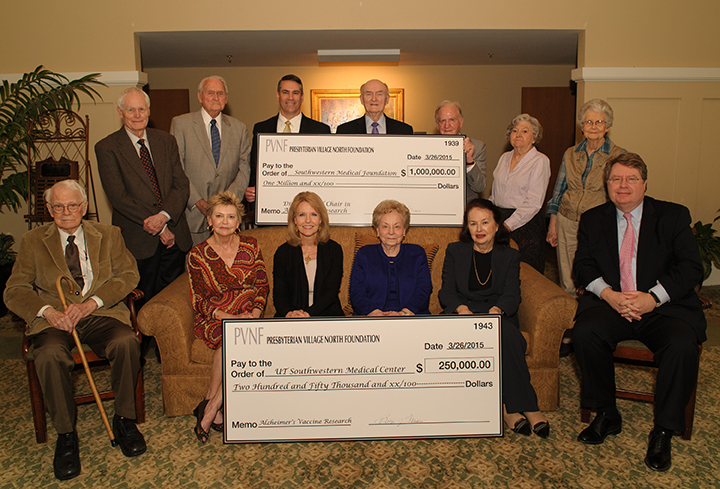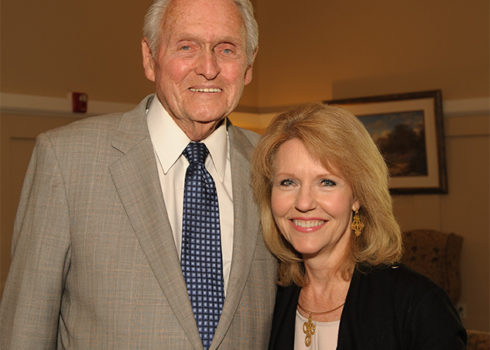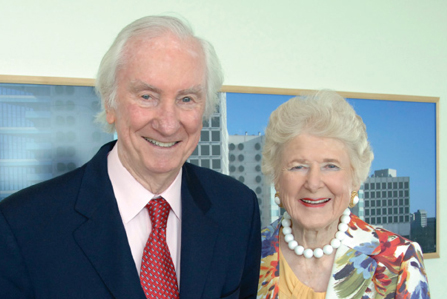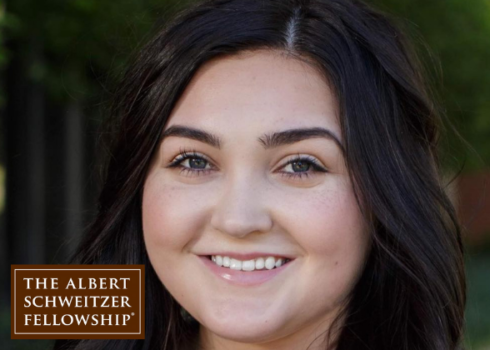Southwestern Medical Foundation celebrates the remarkable life of one of the most beloved pediatricians in Dallas, Dr. Joseph Garland Roach, Jr. We pay tribute to Dr. Joseph Roach, who died peacefully at his home at Presbyterian Village North in Dallas on December 25, 2021. He had recently celebrated his 100th birthday surrounded by dear family and friends.
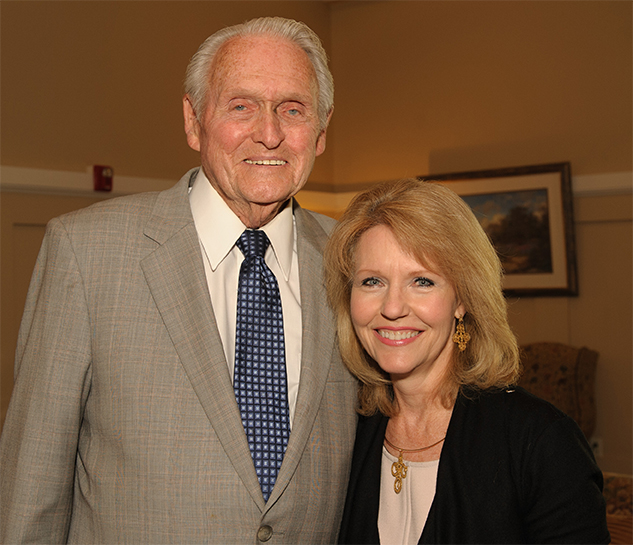
He was a trusted physician who dedicated his life to caring for the tiniest humans and their families. He was born October 16, 1921, in Greenville, Texas, and graduated from Baylor University with an undergraduate degree in chemistry. After earning his medical degree in 1945 from one of the first classes of Southwestern Medical College, he served in the U.S. Navy as a medical officer and completed a pediatric residency at Children’s Hospital of Dallas. In 1950, he established his private practice in Dallas and joined the faculty of Southwestern Medical School as a Clinical Professor of Pediatrics. His brilliant career spanned five decades.
His understanding of children’s physical, mental, social, and emotional development knows no bounds. He cared for children at every stage of their development and devoted his life to healthy children and healthy families.
Community Legacy
Dedicated to his community, Dr. Roach’s impact reached far beyond his pediatric clinic. He was a 32nd Degree Mason, a member of the founding board of Presbyterian Hospital of Dallas, and a founding member of Preston Hollow Presbyterian Church, where he was an Elder Emeritus. In retirement, he served on the board of The Presbyterian Village North Foundation and was instrumental in the creation of a major gift to Southwestern Medical Foundation to establish the Presbyterian Village North Foundation Distinguished Chair in Alzheimer’s Disease Therapeutic Research at UT Southwestern. Dr. Roach also volunteered with the Indian Clinic in Oak Cliff, East Dallas Clinic, Meals on Wheels, and North Dallas Shared Ministries Medical Clinic.
Dr. Roach was instrumental in establishing the Presbyterian Village North Foundation Distinguished Chair in Alzheimer’s Disease Therapeutic Research at UT Southwestern.
Presbyterian Village North Foundation Donates $1,250,000 to Benefit Alzheimer’s ResearchHe cared for our family, and we are all better for the wisdom and understanding he shared with us and with so many families across every spectrum in our city.
Kathleen Gibson, President & CEO of Southwestern Medical Foundation
“Dr. Roach was a great physician in every sense of the word,’ said Kathleen M. Gibson, President & CEO of Southwestern Medical Foundation. “He was a proud graduate of Southwestern Medical College in the earliest days of its existence and he manifested throughout his life a deep and abiding medical wisdom and human understanding. He cared for our family, and we are all better for the wisdom and understanding he shared with us and with so many families across every spectrum in our city. We will miss him always but remember the inspiration and example that he was in our lives.”
A Tribute to Dr. Joseph Roach’s role in Southwestern Medical Foundation’s History
In early 2016, we had the honor of interviewing Dr. Roach and learned more about his tremendous contributions in medicine and community.
On a crowded train, en route from Dallas to Houston in 1942, 25 reluctant medical students made a blood pact, vowing to return to Dallas as soon as possible. The buddies had been accepted to Baylor Medical School in Dallas, but the school’s sudden closure and move to Houston had them packing it south.
“On the way to Houston, we were all mad; not wanting to go,” said Dr. Joe Roach, who later was to become one of Dallas foremost pediatricians. “We wanted to stay in Dallas. Many of us, like myself, had girlfriends here. And families nearby. And we liked Dallas.
“On the train down, the majority of us signed a pledge in blood that we would get back. We stuck our fingers and made an X in blood, promising that we would,” said Dr. Roach, now age 94 and retired.
Two years later, Dr. Roach and a handful of his colleagues got their wish – returning to Dallas to attend and graduate from the newly established Southwestern Medical College (now UT Southwestern Medical School). The medical school was the vision of Dr. Edward Cary, who convinced other Dallas community leaders to join him in providing their expertise, financial support and foresight. In 1939, Southwestern Medical Foundation was formed, with the medical school opening four years later.
For Dr. Roach, Southwestern Medical College was his ticket back. While he’d grown up in the small Texas town of Celeste, then graduated from Baylor University, Dallas was where he wanted to be.
He began at Southwestern Medical College as a sophomore and graduated in 1945 from one of the college’s first classes.
“We wanted to get back to Dallas for numerous personal reasons, but also because we felt that Southwestern Medical College had wonderful teachers and heads of departments,” Dr. Roach said. “Most all were practicing physicians who were active, enthusiastic and smart. They were ground floor people and hands-on teachers. They were out working with patients and could transfer that clinical information to us. They also enjoyed what they were doing, so there was an amazing atmosphere at the school.”
Under Dr. Cary’s leadership, a prestigious faculty had been recruited. The list included Dr. Tinsley R. Harrison, a pre-eminent physician in Internal Medicine, who was also made dean of faculty; Dr. William L. Mengert, Dr. Gladys Fashena, Dr. Arthur Grollman and Dr. Morton F. Mason – all leaders in their respective fields.
While Dr. Cary envisioned a “great medical center…ranking as one of the finest in the nation” and sprawled across a 35-acre tract of land on Harry Hines Boulevard, reality was the first facilities were plywood barracks that commonly were referred to as “The Shacks.”
While education was excellent, the setting left something to be desired, Dr. Roach reminisced.
“You’d walk along and fall through the floor, every now and then,” he said. “But we were enthusiastic about the school and it being in Dallas. And we all knew it was going to work. We instinctively knew the people who were teaching us were doing a great job. Their expectations were high. They would set goals of what they thought we as students needed to do, to stay there. It impressed me and scared me too.”
Dr. Roach decided to become a pediatrician after graduation, following a “process of elimination,” he said.
An internship at a Navy hospital in Maryland, CA – one of the #1 receiving hospital for orthopedic and trauma injuries from the South Pacific during World War II – convinced him not to go into orthopedic surgery. A stint as a medical officer aboard a Navy cruiser, where he and a dentist performed an appendectomy, his first, convinced him surgery definitely wasn’t his bag. Time spent at a veteran’s hospital in Houston, responsible for a heart and ulcer ward, showed that wasn’t it either.
“I decided I would take a pediatric residency,” Dr. Roach said. “I was married at the time and had one child and another on the way. To do a residency in internal medicine was four years; pediatrics was two. I decided I could do that, then get out there and work and start living and paying off my loans.”
After a pediatric residency at Children’s Medical Center, Dr. Roach went into private practice with Dr. Garland McFarland, an already established pediatric physician. He stayed there from 1950 to 1960, and then opened his own practice on Sherry Lane in Dallas’ Preston Hollow area.
Forty years later, he retired – as one of Dallas’ most beloved and well-known pediatricians, commenting that at one time, he had more than 3,000 families on his patient list. “I don’t know how many kids that would have been, as many families had multiple children that came to see me.”
Kathleen Gibson, president and CEO of Southwestern Medical Foundation, said her husband’s family and later, her family, counted Dr. Roach as their pediatrician and a doctor who repeatedly went over and beyond the call of duty.
“The kind of medicine Dr. Roach practiced was the real thing,” Gibson said. “The relationships he built with patients and their parents engendered their trust and loyalty, and love.”
Dr. Roach credits his success to “patience and always being calm.”
“It gives patients a sense of confidence in what you’re doing, if you approach things with a sense of confidence and calmness,” he said. “Patients and their parents that I’ve seen through the years commented that they always felt like I gave them plenty of time. I never rushed them. I gave them plenty of time to say what they wanted to say, and talk about what was worrying them.”
He also touts his excellent education at Southwestern Medical.
“Most of the doctors who came to Southwestern to teach were working doctors – which was such a plus. They weren’t just teaching us facts and providing information, but teaching us how to take care of people by example. They were conscientious and interested in their patients, and it showed.”
Dr. Roach dedicated his life to serving children, their families and the community. He will be missed by all who knew him as a physician and friend. Read Dr. Roach’s full obituary in The Dallas Morning News.
